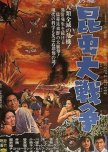
Revenge of the insects!
Genocide was a dark film with a very bleak opinion of humanity. Director Nihonmatsu Kazui threw a lifetime of grievances against the screen to see what would stick-nuclear war, environmental concerns, concentration camps, PTSD, racism (whether intentional or not), sexism (whether intentional or not), murderous insects that could communicate, and the Cold War. That was a lot to tackle in 86 minutes.Joji collects insects on an uninhabited island with Annabelle both for her own study and for his friend, Dr. Nagumo in Tokyo. When Joji and Annabelle are “relaxing” they see a plane catch fire with four parachutes dropping out. Later, two American crew members are found dead and one unconscious. Because Joji tried to sell a watch he found that belonged to a crew member he is arrested for murder. Colonel Gordon wants him to pay for their deaths but he is far more concerned about a missing nuclear bomb. Soviet spies are scouring the islands attempting to find it as well. To complicate matters, killer bees are on the loose bent on destroying humanity. Joji, his wife Yukari, and Dr. Nagumo become hopelessly entangled with a vengeful scientist, predatory insects, and two super powers.
There really was a lot to unpack with this film. Charlie, the black crew member, suffered casual and overt racism from just about everybody. He’d suffered severe PTSD from the war and had become addicted to drugs which caused everyone to treat him even worse. Yukari was sexually assaulted twice and the female doctor once with very little afterthought. The vengeful scientist was a survivor of the notorious Auschwitz concentration camp and had it in for humanity. “I love insects because they never lie.” The American colonel seemed to be a rogue commander willing to start a nuclear war and kill thousands of people to cover up his mistake. The Russians were using the deadly bee research for biological weapons and desperately wanted to get their hands on the bomb. As people showed their ruthlessness and/or utter stupidity on a regular basis, I began to root for the bees.
The actors performed well, something of a rarity for cheap horror flicks. There were several non-Japanese actors who were dubbed in Japanese. I don’t know who wrangled the bee actors but I hope they were paid handsomely. My biggest complaint was in the editing. There were times that people disappeared and ended up somewhere else without explanation. If you have a problem with insects, this film has numerous buggy scenes. I had to turn my head when bodies were infested with creepy crawlies or being chewed on. The science and logic for the film was genuinely lacking. It stretched credulity when a USAF officer believed that detonating a nuclear bomb was a smaller offense than going to the trouble to retrieve it. It's not like someone could have stuffed a multi-ton bomb into a backpack and carried it off the wooded island. Despite gruesome infested wounds, no one would believe the scientists that the insects had turned against humans. Un-bee-lievable.
Genocide was unflinching in its nihilistic view of the world and humans’ place in it right to the bitter end. Nihonmatsu took a stand and didn’t deviate from it. The insects let people know, “The Earth doesn’t belong to humans alone. We don’t care if mankind destroys itself with nuclear weapons, but we refuse to let you take us with you!”
29 October 2024
Trigger warning: Numerous insect scenes in a variety of manner and stages
(Rated on a curve for old, low budget, niche films)
Vond je deze recentie nuttig?

"Family is what you make of it"
Twinsters is one example of the internet and social media being used for good. After taking part in a YouTube video, American actress Samantha Futerman was contacted by a French woman living in London named Anais Bordier. The woman’s profile pic looked eerily familiar. Both women were adopted. Both women were born on November 19, 1987 in Busan. And both women looked exactly alike!This documentary followed Sam making contact with her sister and their journey toward learning more about themselves and their past. Sam grew up with two brothers and feeling accepted at home and school. Anais was an only child and often felt lonely and had anger issues when she was young. She was taunted at school for being adopted and different and did not feel accepted. Both women were excited and nervous about meeting the other. Sam and her family visited Anais and her family in London. Anais later visited Sam in Los Angeles. The sisters traveled to Korea to do more research into their past. Sam had been to Korea before to gain information and had met her foster mom. This time Anais would be able to do the same and discover maybe she’d been loved and cared for more than she’d ever known.
The Twins Study Center did the DNA testing for Sam and Anais as well as testing them for similarities and differences. When in Korea the two women attended the International Korean Adoptees Association gathering where their birth country welcomed them. It was heartwarming to watch two sisters go from not hugging to holding hands and embracing each other. They faced the ups and downs of their adoption stories together and in the process found that they were surrounded by more love than they thought possible.
“Family is what you make of it. There is no definition.”
12 October 2024
Vond je deze recentie nuttig?
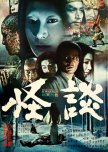
"It was no dream"
Kwaidan is a 1964 film that contained four unrelated ghost stories. The film drew most of its material from Lafcadio Hearn’s 1904 book called Kwaidan: Stories and Studies of Strange Things. Director Kobayashi Masaki crafted each stylized story much like a painting. The skies were often brightly painted backgrounds with each vignette taking place primarily on a soundstage. These were not terrifying or gory tales, more like eerie, karmic, Twilight Zone episodes.1) The Black Hair/Kurokami (B)
An impoverished ronin discovers what goes around comes around aka payback is a bitch when he leaves his loving wife to marry up and take a new position.
2) The Woman of the Snow/Yuki Onna (B+)
A young woodcutter is spared by a snow witch on the grounds that he never tell anyone he saw her. He learns the lesson to never betray a woman.
3) Hoichi the Earless/Miminashi Hoichi no Hanashi (B)
Blind, kind, Hoichi is a young monk at a temple not far from where an epic battle took place 700 years before. The ghostly Heike clan calls upon him to sing the tales of their failed battle night after night. He pays a painful price for his freedom.
4) In a Cup of Tea/Chawan no Naka (B-)
Can you swallow someone’s soul when drinking a cup of tea? A writer receives a proper punishment for writing an open ending to his story.
I enjoyed the stylized view of each of the stories with most having a stage production look and feel. They often appeared surreal, especially Yuki Onna’s swirling eyes in the sky. Each varied in length with Hoichi the Earless being the longest (maybe too long) and In a Cup of Tea being the shortest (maybe not long enough).
The cast for each story was strong. Nakadai Tatsuya played the naïve woodcutter and Kishi Keiko played the complicated Yuki in Yuki Onna. I love his wild eyes though he was the babe in the woods in this segment. Shimura Takashi as a Buddhist priest tried to help the blind Hoichi who was bound to his ghostly visitors each night. Too bad his character didn’t have a strict attention to detail.
Each of the four stories took a different approach to the supernatural though all of the main human characters paid a price for their encounters. Kwaidan had strong performances, taut stories, and a mesmerizing artistic appeal to it. There was an almost poetic rhythm to the moralistic storytelling. While these were technically horror stories, they were the type you could see people telling around a campfire, preferably with any powerful talisman available hanging around their neck.
3 October 2024
Vond je deze recentie nuttig?
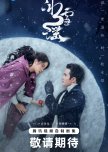
What I Liked:
--Vengo Gao-He was tailor made for the role of a suave, badass vampire.
--Gothic vibes-the dark exteriors and interiors were perfect for this story.
--Costumes-I loved all the velvet, especially Jing Xue’s wardrobe.
--Eternally winter-a great vampire setting. You never see vampires sipping Mai Thais on the beach. The Snowpiercer train ride through the frozen landscape also felt other-worldly.
--Ever present Snowman- I had hoped Frosty would have transformed into a snow monster but we can't have everything.
--Gold Crow-I’m a fan of the Corvus genus of birds though this avian actor was forgotten about much of the time.
--Non-romantic relationship for most of the drama-Based on Mi Lan’s childlike personality, there was definitely a maturity gap and vastly unequal power structure between her and Zhi Heng. Lovers don’t usually tell the other to “drink your milk.”
Neutral:
--CGI-Not great, but not a deal breaker for me
--Ending-spoilery comments after review
--The writers couldn’t use the word “vampire” or show them drinking blood but angry, biting, hair-pulling sex was all right. Mmmm…kay
What I didn’t like
--Zhi Heng written to be utterly stupid and inept in the opening salvo. This brutal scene had him acting completely out of character. They needed a set-up for him and Mi Lan to meet and to show his mostly indestructibleness but man it made him look less than powerful or intelligent.
--Anything that hinted at a romantic relationship. I don’t mind age gaps, but this was a maturity gap. Mi Lan was treated like a 12-year-old and acted like one for much of the drama.
--Terrible wigs-some of the wigs looked like roadkill.
--Both Liang and Situ weren’t written consistently and could give you whiplash with their back-and-forth emotions
--Liang’s plot armor-Zhi Heng could take on a jillion Shadow Warriors but somehow Liang always slipped through his fingers. Although he was always being beaten, shot, etc. Characters would also go into hiding and then come back into the open with no consequences.
--The magical stones element felt ill developed and clunky. Another demerit for censorship-it plays havoc with creativity.
--Wei Lian’s creepy walk on the dark side with Jing Xue
In conclusion:
❄Overall, I enjoyed this drama. It was a nice attempt at the vampire genre given all the restrictions and had a luxurious look. The costumes and settings may have been Republican Era but the drama felt more like a magical storybook which I quite liked. Far from perfect, yet also strangely addictive, Snowfall made for an interesting if fractured fairytale.❄
30 September 2024
Short spoiler below
*********
*********
*********
*********
*********
I didn’t mind the SE. It had been foreshadowed from the beginning. Since I didn’t care for any romance between the two main characters, I didn’t need the HE. The only thing I didn’t care for was the apparent deviation from the source material. Of the Republican Era and strictly historical dramas I’ve watched, the censors seem to prefer sad endings so I know going into these dramas the likelihood of the main couple living HEA is a low percentage. At least it didn’t come out of the blue and the story was headed in that direction from the beginning unlike other dramas where a disappointing ending is tacked on.
Vond je deze recentie nuttig?
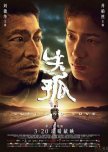
"If you search, fate grows. If you give up, fate dies"
In 2015 it was estimated 20,000 children in China had been stolen and trafficked just for that year. Some were sold for adoption, others for forced labor or prostitution. Lost and Love told the story based on a real-life father who had spent 15 years chasing down leads and searching for his child all over China. Andy Lau gave one of his best performances as the determined father who would never stop in his quest to be reunited with his son.Lei Ze Kuan rides his motorcycle with flags displaying missing children’s faces as he chases down leads on his missing son. After a road accident he meets Zeng Shuai when the young man fixes his bike. It turns out that Shuai was a kidnapped child and “adopted” by the family he lives with. The family has been good to him, but because of his unknown status he cannot go to university, marry, ride the train, or any other thing which requires an id card. He asks Lei to take a side trip and go with him to check on clues as to where his family might be. The two men bond during their road trip seeking the truth they both desperately want.
I’ve watched many films with Andy Lau, but Lost and Love is the first one where I wasn’t constantly reminded by his acting that he was “Andy Lau.” He gave a vulnerable performance as a father who was ridden with guilt and anguished over his loss. This understated interpretation was quite moving. Jing Bo Ran also gave a realistic performance as a lost son torn between wanting to find his biological parents and not wanting to betray his adoptive parents. The chemistry between the two quickly evolved into a surrogate family as they traversed the country. As they grew closer there were several tender and playful moments between them.
Peng San Yuan based the story on real life father, Guo Gang Tang. She added another missing child whose story with Sandra Ng as a trafficker was woven throughout the film, though it did turn melodramatic. Peng illustrated the complicated feelings and responses parents had who lived through the nightmare of having a child stolen from them. Aside from the guilt and fear, the trauma caused marriages to dissolve, mental health to collapse, and for some parents, the despair drove them to suicide. Peng not only wrote the screenplay but also directed the film. The pacing and transitions kept the film flowing even with three stories being told. The film was visually appealing as Peng highlighted the stunning verdant scenery of the countryside and architectural beauty of old chain bridges.
Lost and Love was heartwarming and heartbreaking and did so without falling into the trap of sentimentality. There were a couple of coincidences that were a bit too on the nose, but I’m a sucker for these stories based on real life events and was able to overlook them. I cannot imagine the terror of not knowing if your child was safe and whether you’d ever see them again. I also cannot imagine having the strength to spend every day for nearly two decades following any hint that might bring me closer to that child and dealing with the soul crushing despair every time a lead did not pan out. Lost and Love brought a horrifically painful subject to light while also showing the supportive networks and people trying to reunite families.
If you’d like to see how the real-life father’s story was resolved, see below.
28 August 2024
*****************************************************************
After TWENTY-FOUR years, Guo was reunited with his son!!!
This link still works as of this writing:
https://www.bbc.com/news/world-asia-china-57815491
Vond je deze recentie nuttig?
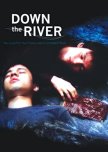
"Let go so you will be happy"
Down the River told the melancholic story of first love through the eyes of Krit, an openly gay high school student. This film was Director Nuchy Anucha Boonyawatana’s graduate school effort so I was lenient in my rating and criticism of it. The story was heavy with Buddhist and natural symbolism interwoven with the boys’ decisions about their futures and whether they would be together or apart.Krit is convinced that if he gives offerings and prayers at nine different temples that his wish to be with Win forever will be granted. The two have bonded since childhood and their friendship has crossed over into something more intimate. Win is going to the academy in order to join the military which would end any type of relationship they might have. Win also refuses to believe he is gay despite their friendship blurring lines with being lovers. He has a girlfriend and knows the military and society will not be accepting of him as a gay man. Krit presses flowers and his memories of Win into a book that he keeps with him that becomes a symbol of his love. On the trip to the temple and hike to the Elephant Waterfall, the seventh of the falls, Krit hopes to convince Win to stay, but to his dismay Win invites two girls to go with them. Further dimming Krit’s hopes are the monk at the temple telling him at the beginning of the trip that in order to be happy he has to let go.
Nuchy filmed numerous scenes of water and the woods set to a score that perfectly matched the mood and natural background. Sadly, several scenes were too dark to see much of anything. I don’t know if that was by design, age, or poor equipment. The film was held back between the dark scenes and rudimentary acting. While Krit came across as more fully developed, Win was a bit of an enigma. Despite the more amateur issues, I enjoyed the film especially as the meaning of the title became clear.
Krit reminisced about his relationship with Win in an almost spiritually poetic manner. While the film had a universal theme of first love, it also showed how first love between members of the same sex faced even more hurdles in a time and place where their love wouldn’t be accepted. Sometimes a person can hold onto their first love and other times they have to let it go to the river of time.
12 August 2024
Vond je deze recentie nuttig?

"I don't have time to get mad anymore"
Filipina director Mae Cruz Alviar and writer Enrico Santos put their own stamp on the relationship time travel trope. They didn’t break new ground but they did commit to their story and characters in a way that came across as authentic.Mary and John have been married for years and have a son together. Mary still deeply loves John and has built her world around helping him to fly while John has become selfish and angry. John never has time for her or their son, Austin, especially after Austin failed to make the football team. Austin tells his dad that Lodz has been talking with him and that everything is going to work out, his dad just has to figure out what he really wants. John asks who Lodz is and Austin shows him a picture of Jesus. When Mary dies the next day, John has his own meeting with Lodz who has a proposition for the guilt-ridden man.
John had a little over a day to put things right and save Mary. Not really long enough to have a complete personality change and to its credit the film showed John faltering at his first challenge. He was smacked upside his head with what was really of value in his life and how much time he’d wasted thinking only of work and himself. The people around him had suffered and been starved of his affection and attention. Mary was a skilled chef and she wanted to fly. Austin was a gifted pianist ready to fly if given the chance as well. John’s eyes were opened to the love and happiness he’d been shutting out for years and how badly he’d hurt his family.
Few people are given second chances and John learned about redemption, accountability, and regret in a crash course delivered by an electrician to help him see the light. Normally, this is the type of film I’d give a 7.5 to for being a good average movie, but I bumped it up for the commitment the filmmakers showed until the end to not take the easy way out.
11 August 2024
Vond je deze recentie nuttig?
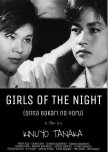
Mrs. Nogami, the headmistress of the Shiragiku Dormitory finds Kuniko work as a live-in worker at a shop. No one there knows what Kuniko used to do for a living. Her boss works her from morning until night and after her living allowance is subtracted from her wages Kuniko will only be making 10, 000 yen/68 USD a year. After her past is revealed, the shopkeeper is determined to demean and replace Kuniko. Rather than be humiliated and taken advantage of, Kuniko takes the situation literally into her own hands. At her next job in a factory, Kuniko tries another tactic and reveals her past to the women in the dormitory. Instead of being supportive her female co-workers violated Kuniko in a disturbingly violent scene. At her third job she finds love, but also runs into the limitations of societal forgiveness and acceptance.
Girls of the Night was one of the few films from this time that was both directed and written by women. Tanaka Kinuyo filmed a fairly progressive film given the timing of the new law. Far from condemning the ex-prostitutes, the film tried to show that the majority of the women sold their bodies due to tragic situations pressuring them from society, family, or personal relationships. Mrs. Nogami time and again supported Kuniko and the other women in her care. When Kuniko asked why it had been okay for her to use her body as she wished before and now it was illegal, Mrs. Nogami had no good answer for her. Girls of the Night also had a lesbian character in a small supporting role, the first I’ve run across in this era. Whether due to the source material or concerns of how the audience would receive the film, they did hedge their bets by having Kuniko be harshly critical of her own past actions and decisions.
The pure and polite society Kuniko interacted with might not have had to sell their bodies to make a living but they also showed they were far from the moral ideal. Kuniko had more than her share of encounters with vile humans but she also found healing in the people who accepted her. The most important person she had to convince that her past could be forgiven was herself. Tanaka’s 5th film in the director’s chair once again showed Mizoguchi Kenji was wrong and that she was quite smart enough to direct a film.
10 August 2024
Vond je deze recentie nuttig?
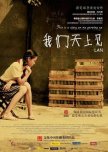
During the 1960’s at the age of three, Jiang Xiao Lan’s parents were sent to the “countryside”. Her 89-year-old grandfather was left in charge of her. Initially enforcing his authority with a ruler style whacking stick, the neighbors convinced him to use his words instead. At school Xiao Lan was ridiculed and taunted mercilessly as a “bastard of counter revolutionaries.” Grandpa wanted Xiao Lan to have a skill so that when she grew up she would not be sent to “the countryside.” She joined gymnastics but was never accepted and always considered an amateur. Lan missed the parents she scarcely knew. The only connection she had to them were their letters that Grandpa read to her. After a time jump, not much changed for Xiao Lan as she entered adolescence.
Lan was beautifully shot as if each scene was a painting, featuring both photogenic actresses who played Lan. Most of the scenes contained either rain or snow with Lan carrying her ubiquitous umbrella. Lovely music accompanied Xiao Lan’s growth from small child to teenager. Zhu Xu as Grandpa Tang gave a tender performance as the man who cared for and tried to shield Xiao Lan from the harsh realities of her life. Yao Jun and Zhu Yinuo seamlessly portrayed the melancholy Xiao Lan who desperately wanted to fit in somewhere and longed for her missing parents. Director Jiang created several whimsical scenes such as Xiao Lan flying across the Huai River with her umbrella to the north to find her parents. There were also several references to missing teeth, the meaning of which eluded me.
Jiang Wen Li composed a touching film showing the consequences of the cultural revolution on families. The relationship between Grandpa Tang and Xiao Lan came across as loving and realistic. While it was beautiful to look at it, I kept waiting for some sort of emotional climax which never came. I enjoyed Lan and maybe on a different day would have rated this graceful film higher.
9 August 2024
(7.75)
Vond je deze recentie nuttig?
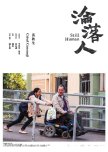
Still Human. Still Dreaming.
Still Human is the kind of heartwarming, healing film that is like catnip to me. I’ve seen this paradigm before of the Filipina maid changing hearts and breaking down barriers, but Anthony Wong and Crisel Consunji put their own stamp on it.Cheong Wing has been confined to a wheelchair ever since a construction accident. His wife divorced him and is now remarried. His son is in the States studying to be a doctor leaving Cheong Wing alone in his miniscule public assisted housing. With his closed off persona believing himself to be “rubbish” and having special needs he hasn’t been able to keep a maid. In walks Evelyn Santos from the Philippines. She speaks no Cantonese and he only speaks a little English, at first glance it does not seem like a match made in heaven as he confiscates her passport. Other Filipinas in Hong Kong tell her to play dumb and never let him know if she learns Cantonese or else her workload will be greater. As Evelyn and Cheong Wing come to know each other and see the other as human, healing and growth occur.
This film highlighted the marginalized people in the community. Evelyn and the other maids were on duty 24/6, with only Sundays off. She suffered derogatory comments and treatment almost everywhere. Cheong Wing struggled to keep his head up as he felt like a burden on his family and friends. Director/writer Oliver Chan hammered home the message that despite a person’s circumstances, as long as they were breathing, a person could have dreams. Everyone needs a purpose, a dream, something for them to reach for in life to give their experience meaning. It didn't matter if the person was old, handicapped, poor, or an other. The two characters broke down those barriers to otherness with respect and compassion.
Oliver Chan made this charming film for around 3.25 HKD/415,000USD. Anthony Wong was said to have forgone a salary. With or without pay he gave a complex performance of a man, father, friend without a reason to live only to be given another chance at meaning in his life. For the most part, Crisel Consunji held her own with Wong as the goodhearted Evelyn with a delightfully wicked sense of humor. “Sir, you even learn Japanese” as Cheong Wing attempted to hide his Japanese porn.
Still Human. Still Dreaming. If you are in need of an uplifting film to remind you that we are all neighbors, all family on this beautiful blue marble, that no one is less than, Still Human is just the ticket.
31 July 2024
Vond je deze recentie nuttig?
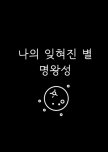
Invitation or Cancellation?
While researching films directed by women, I found this appealing short film by Jang Yi Je. I tried to discover more about the people involved with the making of this film, but this obscure short was lost in the vast space of Pluto titled films and shows. I suppose the numerous Pluto named entertainments could offer solace to the poor bullied planet that was kicked off the starting team of planets in our solar system. #justiceforpluto! But I digress…Yeon Woo is getting married soon, but has one person she needs to see first. She visits the best friend of her childhood, the person she can’t forget. Se Jeong has a pottery studio and is less than thrilled when the familiar face drops by after too many years apart.
Pluto teased a more complex story of familial and societal expectations and judgements. As happens so often in these stories, one person gracefully accepted who she was and the other bowed to the pressure to fit in and be “normal.” How far was Yeon Woo willing to go to please others? Small hints piqued my curiosity. Based on one comment I wondered how controlling was Yeon’s boyfriend. Se Jeong had hated the pottery studio as a child and now creates works of art. I would like to have known her backstory as well. My biggest complaint other than the blown-out photography was because it was a pottery studio, the film succumbed to the overly used Ghost trope.
These short films can be maddening when they seem to have enough material for a full-length film. In a mere twenty minutes, I began to feel invested in these two women and their stories. Was their love deep enough to forgive the past and courageous enough to walk hand-in-hand into the future?
1 August 2024
Vond je deze recentie nuttig?
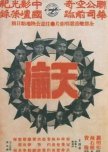
"Grant all children a place in your heart, and regard the elderly as your own"
Song of China was difficult to rate as it was a film fragment with at least one reel missing. The beginning and ending seemed to be intact, but there was a bridge of information needed to make some connections. During a time when leftist movies were being made this film called people to return to traditional values and highlighted the moral superiority of rural life. It was the first Chinese film to be shown in the USA, but it also suffered from Hollywood interference with the story editing and subtitles.A dying father beseeches his son to “Grant all children a place in your heart, and regard the aged as your own.” The son and his young family move to the city in search of better opportunities. During the early days of the Republic, his son marries. The new couple spends most of their time partying, leaving their baby in the grandparents’ care. After a time, the father decides to move them back to a rural life. He and his wife guide their grandson, teaching him Confucian values. When the father sees poor peasants outside the window as a raucous party held by his son rages on, he determines to open an orphanage and school to comply with his father’s dying wishes.
The conflicts between the generations, traditional vs modern values, and city vs country life all played out in this story of 3 generations in a family. I’m sure there was a political motivation for the return to traditional virtues, but I’m not well versed enough in the history to make an informed discussion of it.
I did find a 1936 *NYT’s review interesting. It said "The subtitles were more Chinese in flavor than the performances." The subtitles were actually translated how Americans thought the Chinese talked in a much more flowery way. The reviewer was expecting Chinese Opera style acting and found the acting to be subdued. The acting is what I liked. In early American silent films, the acting could be hammy and overdone. I quite enjoy the often more realistic acting of Chinese and Japanese silent films.
The film I watched was the shortened 45-minute version and was badly degraded. The music was appropriate though I don’t know if it was original. There is a 65-minute version somewhere. While it could be heavy-handed with the filial piety sermonizing it still had entertaining moments and was an interesting snapshot of how some people felt during this time of transition.
16 July 2024
*https://www.nytimes.com/1936/11/10/archives/song-of-china-an-allchinese-silent-picture-has-a-premiere-here-at.html
Vond je deze recentie nuttig?
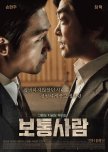
"It ends fast if you stay still"
What will an Ordinary Person do in the face of poverty and corruption? Will an Ordinary Person fight for the children’s future at the cost of his own? What would an Ordinary Person do for his child’s health and future? Set in Seoul during the turbulent 1980’s, two ordinary men would have to decide how much of themselves they could give away and whether they could do something extraordinary.Kang Sung Jin is a police detective barely making ends meet with a mute wife and a son who needs an operation on his leg. Providence seems to reach out and touch him when Choi Kyoo Nam of the Intelligence Agency gifts him an envelope containing evidence of a serial killer. The killer just happens to be in Sung Jin’s jail cell. It’s up to Sung and his partner to gather the witnesses and coerce a confession from Kim Tae Sung. It’s not long before his friend and reporter Chu Jae Jin, points out conflicting evidence putting Sung Jin in not only an ethical dilemma but both men in a life and death one.
The events in the movie lead up to the 1987 Defense of the Constitution and demonstrations. Torture and forced confessions were business as usual. Jang Hyuk’s Choi Kyoo Nam was ruthless and saw those beneath him as mere dogs which he could order to do his bidding. If they faltered, he would just make dog stew out of them. The Intelligence Agency had its tendrils everywhere.
Ordinary Man forced its characters to dig deep and make diligent and dangerous decisions. Like in an old Kaiju movie, the monster didn’t truly reveal himself until the forty-minute mark. The film could have used some trimming to narrow down the story and focus. It started out with a comedic chase, but anyone who has watched Korean movies knows better than to take that bait, it’s never long before the pain sets in.
Sung Jin found that once you did the devil’s bidding, there was no turning back. A new car, money to spend, an operation for his son all seemed like a dream come true until it became a nightmare of agonizing ethical choices. Choices had consequences, terrible irrevocable consequences. This was not an action movie, and only the framework had to do with the pervasive corruption in society. At its heart, the film asked what would an ordinary man do when faced with dire moral challenges never knowing if his choices would change anything for the better or if he’d be able to live with them.
"If I don't fall, no one can knock me down."
5 July 2024
Vond je deze recentie nuttig?

"Reality continues after miracles"
Dr. Storks S2 continued the stories of the doctors in the OB/Gyn and NICU departments at Persona Hospital. Miraculous stories of new life and stories of heartrending losses were shared. This time around there was also focus on the reality that faced many of the new mothers before and after the miracle of birth.Dr. Konotori Sakura with his cheerful and uplifting personality still seeks to give mothers and their babies the best chance at success. Dr. Shinomiya Haruki is there to balance our Sakura’s optimism with a strong dose of if not pessimism, a harsher view of reality. Imahashi Takayuki remains the rock of labor and delivery as the head of the department and NICU. Komatsu Rumiko, the midwife, helps keep everyone grounded and focused on the mothers’ experiences and needs. The team confronts all sorts of crises for mothers and babies alike. There would also be movement in and out of the department as people seek to broaden their educations or return from other experiences.
For my review of S1 I lamented the lack of women doctors. The OB/Gyn profession is dominated by women in my country and around half of the neonatal docs are female as well. Then I read this, “In 2018, Tokyo Medical University admitted to manipulating women applicants’ entrance exam scores for years to restrict the number of female doctors, in part because they were performing better than male applicants.” * The previous statement helped explain the dearth of women in the profession. It might also explain why the women were either portrayed as overly emotional or with almost no emotion and why one of the doctors was worried if she became pregnant she couldn’t continue to work as a physician. With all the public service announcements they had in the drama, it would have been nice to have shown competent and emotionally stable women physicians. Also, NICU nurses are the unsung heroes in that department and they were an almost invisible presence in the drama with the doctors doing all the work. Rant over.
I did like the holistic approach they had toward prenatal care and labor. The support a couple with a stillborn child had from the staff was particularly moving. The midwife, Komatsu, pushed the need for more maternal services before and after the birth. This season brought up the demand for support for postpartum depression, birth defects, and multiple miscarriages. Another topic of interest presented remote places with limited medical facilities. Women carried a great burden along with their babies if doctors were too far away. Without babies, remote places’ futures came into question.
If S1 was about the miracle of life and birth, S2 dealt with the reality of life of not only birth, but after the baby was taken home. Much emphasis was also put on teamwork both with the doctors and patients. Doctors and new parents need emotional support and also support in order to become better at what they do. While I enjoyed S2, I didn’t find it as compelling as S1.
“If you want to go fast, go alone. If you want to go far, go together.”
27 June 2024
*https://geographical.co.uk/culture/countries-with-the-most-female-doctors
Vond je deze recentie nuttig?
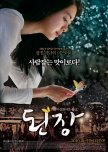
"You wait"
The Recipe began with a transformative bowl of stew and then worked its way backwards to the origin of the enthralling recipe. There were slow moments where the film tended to get lost in the weeds of the intricacies of making Doenjang Jjigae, but all was forgiven as the investigation finally revealed the truth.After his execution, Kim Jong Gu’s last request sets investigative reporter Choi Yoo Jin on his tireless quest to discover what kind of stew would be the murderer’s last thoughts. As Choi digs into the story he ascertains that the stew was so fragrant and delicious that Kim never felt the cuffs being put on. In fact, the officers were frozen at the tantalizing smell. In his efforts to track down the woman who made the doenjang, he meets one by one all the people who helped with the extensive steps she took to make the magic happen. Choi’s boss isn’t enraptured with the tale but that doesn’t stop the intrepid reporter until at last he learns how love and tears contributed to the story.
While I enjoy recipe detective work, the fine details of each step of the process often bogged the film down. If you are watching for Lee Dong Wook, you may be disappointed. He doesn’t show up until over an hour into the film. This was largely Ry Seung Ryong’s film as Choi Yoo Jin. The veteran actor showed Choi going from cynical to obsessed over the effects the stew had on people and the extraordinary details that went into it. Finally, his journey would lead him to the tragic love which inspired Jang Hye Jin’s recipe.
Anna Lee (Lee Suh Goon) directed and co-wrote this film. Her painstaking attention to food and ingredients and all the people whose hands touched the different elements was intriguing. In the same way Hye Jin had to wait on her soybean paste to ferment, this film will make you wait for the emotional payoff. Ultimately, the conclusion I came to was one any child or grandchild knows instinctively, food made with love and loving attention is the best.
17 June 2024
Vond je deze recentie nuttig?

 55
55 223
223 11
11






















